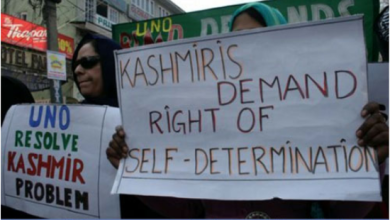Article: India’s Strategic Dilemma: Supporting Authoritarianism or Democracy?
Ukkashah Shaikh

India is the self-proclaimed biggest democracy in the world. In its June 2024 elections alone, India’s election officials counted an estimated 640 million votes, making it the biggest democratic exercise in world history. Due to the pluralistic and secular practices in Indian elections, along with consistently elected democratic governments since its independence, India is believed to be the beacon of democracy and democratic principles in South Asia. It has been a cornerstone of its international identity. However, in light of recent events unfolding in Bangladesh, India’s democratic image is being challenged.
The Bangladesh Liberation Movement from Pakistan in 1971 was openly supported by India on all grounds. Under the leadership of then Prime Minister Indira Gandhi, India brought the Bangladesh movement to the global stage, advocating for its eastern neighbour’s right to independence. Not only this, it provided armed support to Mukti Bahini, an armed rebel force fighting for the freedom of Bangladesh, providing them combat training, weapons, and ammunition to fight against the Pakistan army in former Eastern Pakistan. In 2015, the current Prime Minister Narendra Modi, while in Bangladesh, admitted to the conspiracy to divide Pakistan, adding that the formation of Bangladesh was an “Indian dream”.
Even after 53 years of Bangladesh’s independence, Indian assistance is lauded as a bold move supporting the democratic aspirations of the people of Bangladesh. Yet, its unwavering support of Sheikh Hasina Wajid paints a different picture. In the January 2024 Bangladesh elections, Sheikh Hasina’s Awami League claimed 75% of the seats, winning her 5th term as premier. Despite the US and UK expressing grave concerns over the legitimacy of the election results and the newly formed government, India continued to reinforce Hasina Wajid’s government. It clearly states that India is not a champion of human rights and democracy in South Asia; instead, it prioritizes its strategic interests.
Moreover, this alignment is troubling as under Sheikh Hasina’s leadership, Bangladesh has seen a rapid rise in human rights abuses. As per a 2023 report by Amnesty International, Hasina’s government labelled Bangladesh’s largest newspaper, Prothom Alo, an enemy, threatened various journalists and critics, and even detained young girls and women linked with critical voices of the Bangladeshi diaspora. By aligning with a leader who has been accused of undemocratic practices, India’s democratic principles are being questioned.
India’s support for Hasina is deeply rooted in history. Since Bangladesh’s independence, India has proved to be a steadfast ally of her family, beginning with her father and the founding leader of Bangladesh, Sheikh Mujibur Rehman. After the assassination of Sheikh Mujib and most of Hasina’s family in 1975, she spent 6 years of her exile in India. These were the formative years of Hasina’s life and her political career. Even after winning her 4th consecutive term on January 7th, Hasina expressed gratitude to India. Yet, this persistent support for Hasina Wajid compromises India’s democratic image.
Furthermore, Hasina’s evident proclivity towards India has undoubtedly influenced the two countries’ diplomatic approach to each other. Besides this, maintaining strong relations with Bangladesh is essential for India’s South Asia Strategy and “Act East” policy. Thus, it stands to benefit from Hasina’s Awami League as Khalida Zia’s Bangladesh National Party (BNP) is not appreciative of Bangladesh’s overreliance on India. Former PM Khalida Zia has been vocal about her disapproval of the Hasina government’s positive ties with India.
Irrespective of India’s support for the authoritarian regime of Sheikh Hasina and her Awami League, its support can push the new Bangladesh government into the Chinese camp. Bangladesh, even during Hasina’s premiership, was going through tense relationships with Washington and an increasing alignment with Beijing. Given that India-Bangladesh relations tend to struggle whenever Sheikh Hasina is not in power and China investing $38 billion in the Belt and Road Initiative (BRI), Bangladesh may pivot closer to China, altering the regional geopolitical landscape in ways that could disadvantage India.
Given this, Pakistan can use international forums like the UN, OIC, and SAARC, to highlight the Indian hypocrisy. It can draw attention to India’s support for an authoritarian regime in Bangladesh. Through this, Pakistan can challenge India’s self-proclaimed role as a champion of democracy. Thereby, it can diminish India’s moral authority on global platforms. Particularly in SAARC, Pakistan can collaborate with regional states to form a bloc that advocates for genuine democratic practices in the region. This coalition could push for reforms and greater scrutiny of electoral processes in countries like Bangladesh, where India’s influence is strong.
While India’s support for Sheikh Hasina may be driven due to its strategic interests, it poses significant threats to its democratic values and diplomatic standing in South Asia. The challenge for India is to navigate this complex relationship without compromising the principles that have historically defined its identity as a global leader in democracy. The stakes are high, and the world is watching as India’s choices in Bangladesh may well determine its future role in the region.
(The author is a graduate in Peace and Conflict Studies from National University Modern Languages (NUML), Islamabad, and can be reached at ukkashahshaikh@gmail.com)








